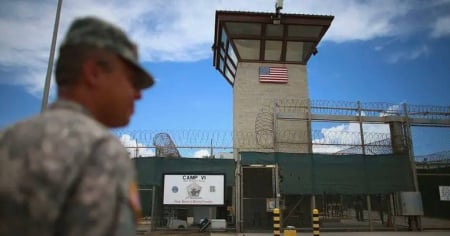President Donald Trump announced on Wednesday the construction of a detention center at the Guantanamo naval base in Cuba, which will have the capacity to accommodate up to 30,000 migrants.
During the signing ceremony of a new law, Laken Riley Act, which marks the first legislative step of his new administration, Trump explained that the measure aims to strengthen control over illegal immigration and keep migrants accused of serious crimes in a detention center.
He indicated that those living illegally in the United States who cannot be deported to their countries of origin will be sent to the naval base in eastern Cuba.
"We are going to send them to Guantánamo," the president stated in the East Room of the White House.
The Guantánamo naval base has previously been used to house detainees as part of the so-called war on terrorism led by the United States, and in previous decades, dozens of Cuban rafters were sent there.
Now, it will be designated to house individuals who are in the country illegally and cannot be deported due to various circumstances, Trump suggested.
The Laken Riley Act was named in honor of Laken Riley, a 22-year-old nursing student from Georgia, who was murdered in February 2024 by José Antonio Ibarra, a Venezuelan who was in the country illegally.
Ibarra was sentenced in November to life imprisonment without the possibility of parole.
Trump emphasized during the signing of the law that this measure is a "legislative milestone" and a "tremendous tribute" to the young woman who passed away.
"It is a tremendous tribute to his daughter what is happening today," he said. "It is very sad that we have to do this, but this law is going to save countless lives," Trump added, who is at the center of several controversies regarding his immigrant roundup.
The law stipulates that individuals who are in the country illegally and are accused of violent crimes or theft should be detained and potentially deported, even before a judicial conviction occurs.
At the end of Joe Biden's term, he released 11 prisoners who had spent a long time in Guantanamo; however, 15 men remained there, six of whom have never been formally charged with any crime, and three were authorized for release.
Frequently Asked Questions about the Construction of the Detention Center in Guantanamo by the Trump Administration
What is the purpose of the new detention center in Guantánamo?
The purpose of the new detention center in Guantánamo is to accommodate up to 30,000 migrants who are illegally in the United States and cannot be deported to their home countries. This measure aims to strengthen control over illegal immigration and to keep migrants accused of serious crimes in a detention facility.
What is the Laken Riley Act and what is its purpose?
The Laken Riley Act is a law signed by Donald Trump that establishes the detention and potential deportation of individuals in the country illegally accused of violent crimes or theft. The law was named in honor of Laken Riley, a young woman murdered by an illegal immigrant, and aims to serve as a tribute to her memory and a measure to save lives.
How does this measure fit within Trump's immigration policy?
This measure is part of a stricter immigration policy that the Trump administration has implemented to enhance border security and prioritize the deportation of immigrants with criminal records. This includes the reversal of previous immigration policies and the implementation of new immigration control measures.
What impact could the construction of the center in Guantánamo have on U.S. international policy?
The construction of the center in Guantánamo could strain international relations between the United States and countries that resist accepting deportees, such as Cuba. Furthermore, it could generate criticism from human rights organizations and governments that view these measures as violations of migrants' rights.
Filed under:
